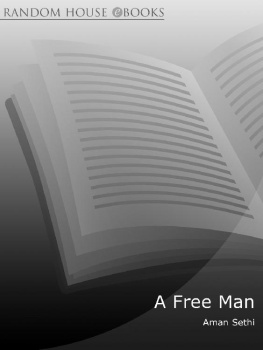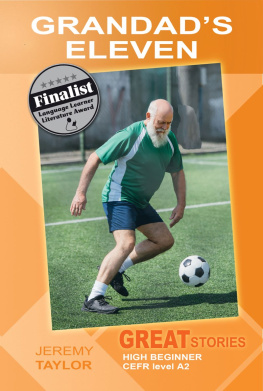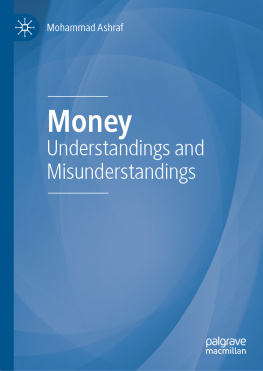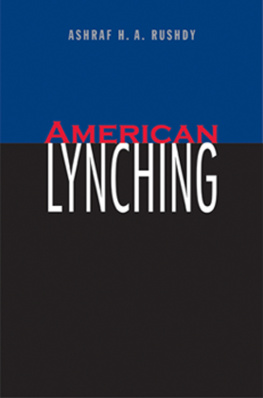Contents
About the Book
Every morning in Sadar Bazaar, one of the oldest markets in Delhi, a gang of men gather looking for work in the building trade. For five years, Aman Sethi shared their lives, and in particular that of Mohammed Ashraf. Ashraf is a mazdoor, an itinerant house-painter, but hes not a typical labourer hes studied biology in college, and after college learnt how to repair TV sets, cut suits, and slice chicken. He lived all over India, but now he finds himself in Delhi: the second most populous city in the country. The morning will bring hangovers, whisky breakfasts and possibly answers to the lingering questions that haunt Ashraf. How did he get here? Why is he the way he is? And is there a way back home?
One of the very best young journalists in India, Aman Sethi brings Ashraf vividly alive and illuminates the lives of countless others like him. Wry, humorous and insightful, A Free Man is an unforgettable portrait of an invisible man in his invisible city, and an extraordinary human story.
About the Author
Aman Sethi was born in Bombay in 1983. He studied chemistry in Delhi, and journalism in Chennai and New York. He is currently the Chhattisgarh correspondent for The Hindu. This is his first book.
For Anjali and Rajesh Sethi
one
AZADI
AT FORTY, SAYS Mohammed Ashraf, delicately picking at the joints smouldering cherry, a man starts to fear strangers.
Accha?
At twenty, he is cautious; at thirty he is wary, suspicious by thirty-five, but fear? Fear starts at forty.
Accha bhai, now pass.
Mohammed Ashraf looks up with an air of enquiry in his bloodshot eyes. Our circle of huddled figures stares back hungrily. He takes another hit from the joint. At forty his arms weaken. His shoulders sag a bit, his moustache droops. His voice might cracklike a phata hua harmonium. His friends, if he still has any
Pass, Ashraf bhai. Pass. Muffled, yet insistent, a voice has emerged from somewhere in our midst. For a quarter of an hour we have sat in silence as Ashraf has extolled the virtues of ticketless train travel, counted the blessings of being in jail, and, with a rolled-up shirt in one hand and a slender paintbrush in the other, demonstrated the proper technique for skinning chicken. We have stifled our yawns, crossed and uncrossed our legs, and swatted away squadrons of mosquitoes as Ashraf has pulled and sucked and ashed at the joint wedged firmly between his fingers.
Sorry, does someone want this?
The crowd shuffles. In our circle, the joint has moderated conversation; microphone-like, it singles out its holder as the speaker. Tranquillized by the ganja, exhausted by a long day of work, Ashraf is nonetheless invigorated by the ease with which he has commanded the undivided attention of all present. Weve stared fixedly as hes brought the joint to his lips and taken deep, satisfying drags; weve inhaled as hes inhaled, winced as hes choked on the sharp, bitter smoke; weve held our breath to allow the weed to exert its mystical powers, and exhaled as hes expelled smoke from his lungs.
Arre, pass, Ashraf bhai? Rehaan asks again. They look at each other for the briefest of instants, wondering if the impoliteness of hurrying someones hit is outweighed by that of holding the joint too long. Ashraf knows that he can hold off passing the joint for only as long as he can keep us immersed in his tale, and we have finally run out of patience. It was an interesting story, but a timer has finally gone off in someones head. I can hear it; it sounds like the tapping of a screwdriver against an empty tea glass. Its Lalloo.
Lalloo has finished his whisky, Rehaan has smoked his beedi down to his fingertips, and I? I have maintained a firm grip on the edge of the concrete stair, and am happy to report that I havent fallen over.
The joint has passed on: Rehaan, its newest custodian, is desperately peddling a tale of rutting pigs, fighting mynahs, and the sorrow of the Ranikhet disease, scourge of poultry farmers. He knows hes on borrowed timeheaded inexorably for that moment when someone sitting to his left shall look up at him and, almost inaudibly, mutter, Pass?
If I could speak, I would urge Rehaan to take his time and savour it. But the whisky has thickened my tongue and the beedis have scorched my throat; I fear the joint might kill me. Lean back, Rehaan, and tell us the longest, juiciest story you know. Let it start from when you were two years old, scrabbling around in a sunny yard in a village in Uttar Pradesh, and stretch right up to today, twenty years later: when you have lost your virginity, started smoking, stopped speaking to your mother, fallen out with your brother, and fallen in with this lot outside this shuttered shopfront at this crossing at seven in the evening in Sadar Bazaar.
But I cant speak for fear of puking up the raw paneer and freshly boiled eggs that I ate fifteen minutes ago. Hopefully by the time Rehaan finishes his story, the pillar with the surveillance cameras will stop spinning, my seat will stop swaying, the light from the street lamps will no longer crash against my eyelashes and shatter into a thousand luminous fragments, and I may just contemplate a hit of that jointnot because I want to, no sir, but because I have to. This joint, like everything else that follows, shall be for research purposes only.
Im looking for a man named Mohammed Ashraf, I said to a short, scruffy man who identified himself as Lalloo. I had interviewed him for a story last year. Im from the press.
Mohammed Ashraf is a short man, a slight man, a dark man with salt-and-pepper hair; a sharp man, a lithe man, a polite man with a clipped moustache and reddish eyes.
I first met him in December 2005 while working on a story on a proposed Delhi government bill to provide health insurance for construction workers. I had spoken with all the experts, got all my quotes, and arrived early one morning to meet some construction workers and fit their views into a story that, for all purposes, I had already written. As I recall, Ashraf had been a terrible interview subject. He had refused to answer any questions directly, choosing instead to offer up quotes like If you had studied psychology, you would know that if you sleep without washing your feet, you get nightmares. After this cryptic insight he had clammed up and refused to offer his opinion on the Building and Other Construction Workers Act of 1996 and its proposed successor.
Six months later I was back in Sadar Bazaar, this time on a fellowship, searching for that very same Ashraf with the bombastic quotes. It would be a struggle to convince him to actually answer my questions, but I had time and Ashraf, as my editors and I had noted, made for excellent copy.
Ashraf? ASHRAF! Lalloo shouted as we picked our way through the maze of alleys behind Bara Tooti Chowk, Sadar Bazaar. Look what a nice angrezi murgi weve found you!
An AC-type murgi, added Rehaan, a muscular young boy of about eighteen, who sidled up to the two of us, and had crushed, filled, and smoked a joint by the time we found Ashraf nursing a hangover in a shady corner of Barna Galli.
Youve come back, said Ashraf, pulling on his beedi. Are you working on another story?
No, no, I replied. This time its a research project. I want to understand the mazdoor ki zindagithe life of the labourer. I want to interview you some more.
What happened to the last one? Did you bring a cutting of your article?
No.
Next page













